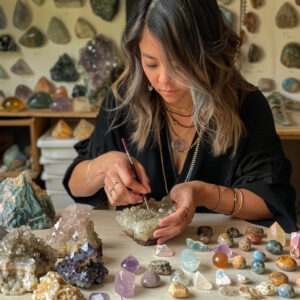What to know
- Heat-treated citrine is often indistinguishable from natural citrine in terms of appearance, making it a popular and affordable alternative.
- In jewelry, citrine is often set in rings, necklaces, earrings, and bracelets, adding a touch of warmth and elegance to any outfit.
- To maintain the beauty and energy of citrine jewelry, clean it regularly using a mild detergent and warm water.
In the realm of gemstones, citrine stands out with its captivating golden hue, often likened to the warmth of the sun. Its allure extends beyond its radiant beauty, as citrine is also imbued with various metaphysical properties. However, one question that often arises is: is citrine rare? The answer to this query is not straightforward, as the rarity of citrine depends on several factors that influence its availability and value.
Natural Citrine: A Gemstone of Limited Occurrence
Natural citrine, formed through the heat treatment of amethyst, is a relatively rare gemstone. Its formation requires specific geological conditions, including the presence of iron oxides and exposure to high temperatures. The scarcity of natural citrine is further compounded by the fact that not all amethyst crystals are suitable for heat treatment, and the process itself can be challenging and unpredictable.
Heat-Treated Citrine: A More Abundant Alternative
While natural citrine is rare, heat-treated citrine is more widely available. This process involves heating amethyst or smoky quartz to high temperatures, resulting in the transformation of their color to a golden hue. Heat-treated citrine is often indistinguishable from natural citrine in terms of appearance, making it a popular and affordable alternative.
Factors Influencing the Rarity of Citrine
Several factors contribute to the rarity of citrine, including:
- Geological Conditions: The formation of natural citrine requires specific geological conditions, which are not commonly found in many regions.
- Heat Treatment: The process of heat-treating amethyst or smoky quartz to produce citrine can be challenging and unpredictable, affecting the availability of heat-treated citrine.
- Color and Clarity: Citrine with intense golden color and high clarity is considered more valuable and rare than those with paler hues or inclusions.
The Value of Citrine: Rarity and Quality
The rarity of citrine, coupled with its captivating color and metaphysical properties, contributes to its value. Natural citrine is typically more valuable than heat-treated citrine, as its formation is rarer and more unpredictable. The value of citrine is also influenced by its color, clarity, and size, with larger, more intensely colored, and inclusion-free stones commanding higher prices.
Citrine’s Versatility in Jewelry and Healing
Citrine’s popularity extends beyond its rarity and value. Its golden hue and metaphysical properties make it a versatile gemstone for jewelry and healing. In jewelry, citrine is often set in rings, necklaces, earrings, and bracelets, adding a touch of warmth and elegance to any outfit. Its purported ability to promote positivity, abundance, and creativity has also made it a sought-after stone for healing and spiritual practices.
Caring for Citrine: Preserving Its Beauty and Energy
To maintain the beauty and energy of citrine, proper care is essential. Citrine should be cleaned regularly using a mild detergent and warm water, avoiding harsh chemicals or ultrasonic cleaners. It should also be stored in a cool, dry place away from direct sunlight to prevent fading or discoloration.
A Rare Gemstone with Enduring Appeal
Citrine’s rarity, captivating color, and metaphysical properties have made it a treasured gemstone for centuries. Its versatility in jewelry and healing further enhances its appeal, making it a popular choice among gemstone enthusiasts and collectors alike. Whether in its natural or heat-treated form, citrine continues to captivate with its golden radiance and enduring allure.
Frequently Asked Questions
Q: Is citrine a rare gemstone?
A: Natural citrine is relatively rare, while heat-treated citrine is more widely available. The rarity of citrine is influenced by geological conditions, heat treatment processes, and the gemstone’s color and clarity.
Q: What factors determine the value of citrine?
A: The value of citrine is influenced by its rarity, color, clarity, and size. Natural citrine is typically more valuable than heat-treated citrine, and stones with intense golden color, high clarity, and larger sizes command higher prices.
Q: How can I care for my citrine jewelry?
A: To maintain the beauty and energy of citrine jewelry, clean it regularly using a mild detergent and warm water. Avoid harsh chemicals or ultrasonic cleaners. Store citrine in a cool, dry place away from direct sunlight to prevent fading or discoloration.
